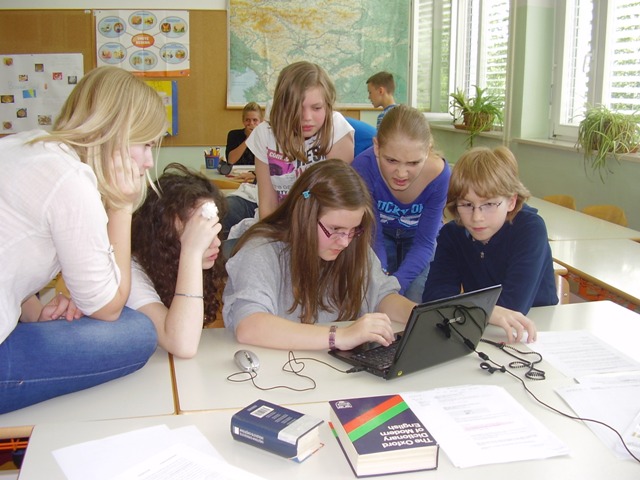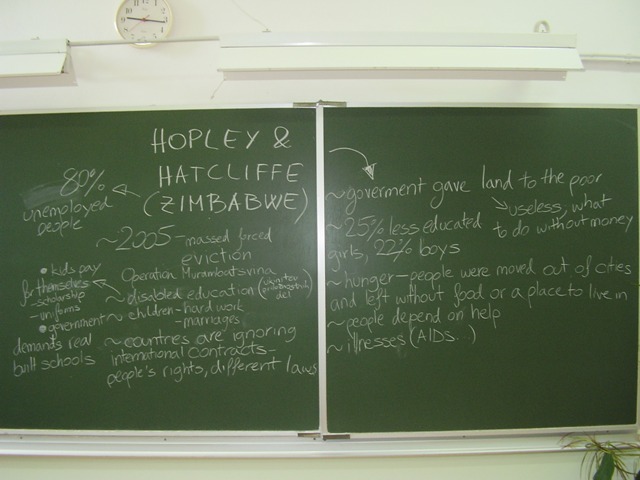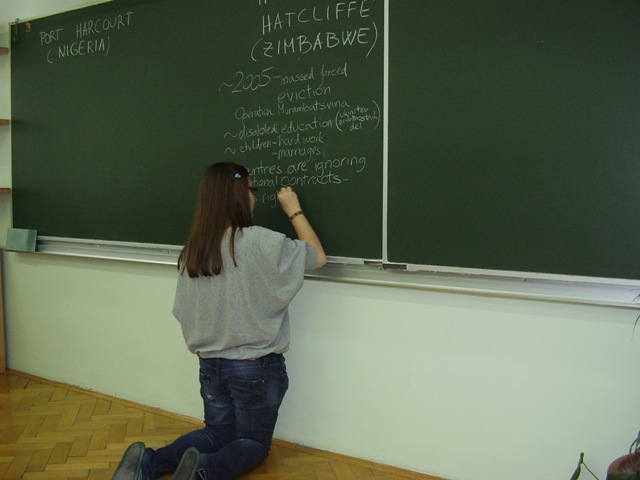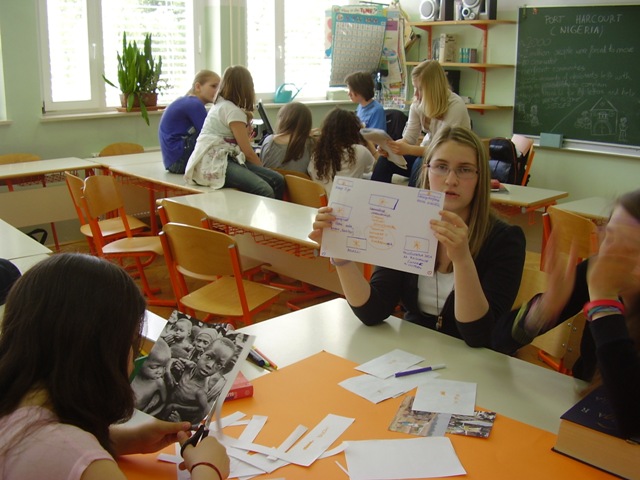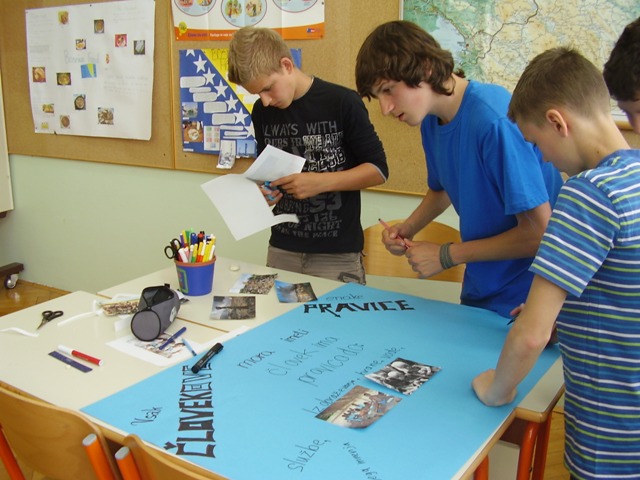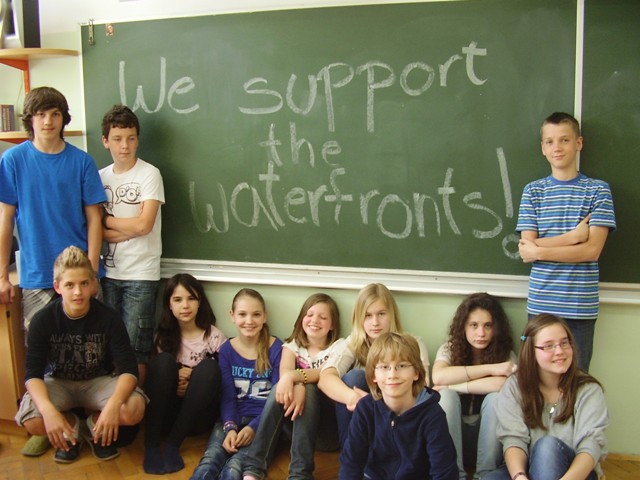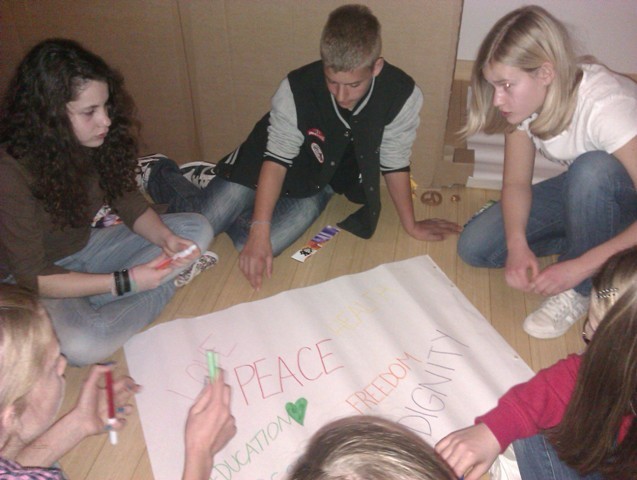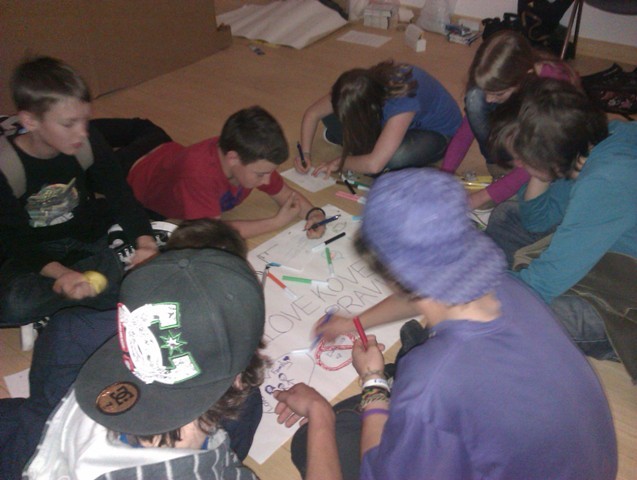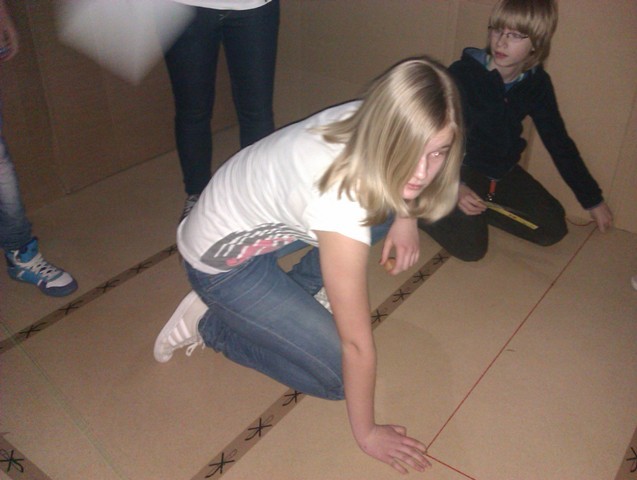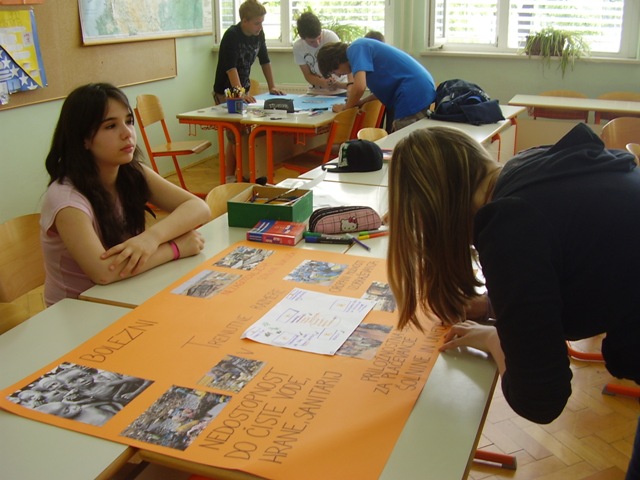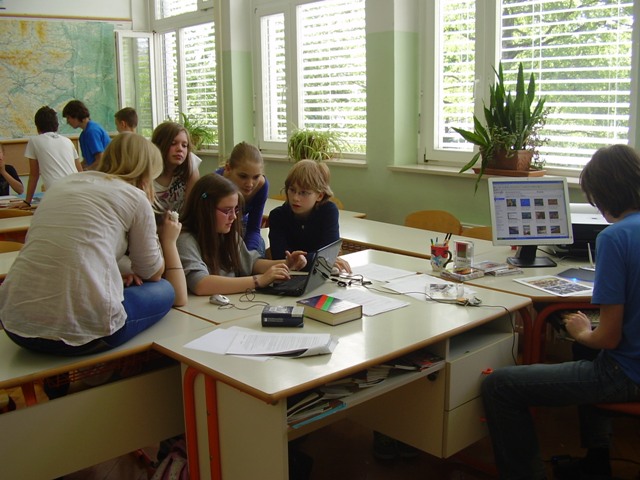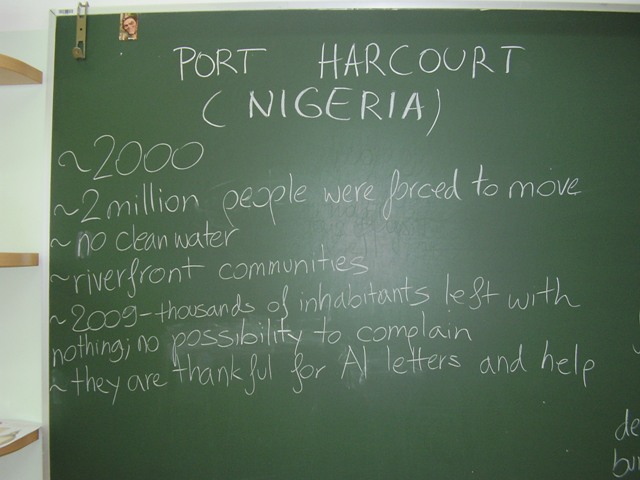Projekt šolske skupnosti v sodelovanju z Amnesty International Slovenije
Izobraževanje za človekovo dostojanstvo
Delavnice o slumih in diskriminaciji
Po obisku delavnic o slumih v Cankarjevem domu, kjer smo izvedeli veliko o življenju revnih ljudi in si tudi ogledali dokumentarni film o revni četrti v Aleksandriji, smo se udeleženci šolske skupnosti zbrali, da bi skupaj z učiteljico angleščine in pedagoginjo Alenka Fajfar napisali pismo predsedniku Nigerije in šolskemu ministru Zimbabweja. Zatem nam je pedagoginja pripravile tudi delavnice na to temo.
V prvem delu delavnic nam je učiteljica Bernarda pripravila angleške povzetke iz poročil Amnesty International s spletnih strani, ki smo jih nato skupaj prebrali, zapisali ter se o njih pogovorili. Nato smo v angleščini napisali dve pismi. Predsednika Nigerije smo opozorili na problem obrežnih naselij (riverfronts) in svoje trditve podkrepili z argumenti in izvlečki iz anonimnih zgodb nekaterih tamkajšnjih prebivalcev. Tam ljudje namreč živijo v zasilnih bivališčih, narejenih iz tistih materialov, ki jih najdejo. Otroke poučujejo tisti prebivalci teh naselij, ki znajo vsaj brati in pisati. Šola poteka pod zasilno streho, npr. pod drevesom, učenci pa pišejo s palicami v pesek. Na tak način jim v glavah pač ne ostane prav veliko.
Starši večinoma nimajo dela, čeprav bi ga radi. Ker nimajo dela, nimajo denarja, to pa vodi do pogojev, kot so pomanjkanje hrane in pitne vode, slaba izobrazba in pomanjkanje osnovnih potreb; pogosto ima eno naselje le eno ali dve stranišči za vse.
Medtem ko je naša skupina naštevala vse težave, s katerimi se ubadajo prebivalci obrežnih bivališč, je druga skupina ustvarjala plakate na isto temo. Slik učilnic pod milim nebom, okupiranih malih vodnjakov in podhranjenih ljudi res ni manjkalo. Čeprav so pogoji, v katerih živi veliko prebivalcev Nigerije in Zimbabveja grozljivi, sem se pri delu zelo zabavala, zlasti sem bila zadovoljna,da sem imela priložnost s konstruktivno kritiko opozoriti predsednika in ministra na njun nesprejemljiv način ravnanja z ljudmi. Revščina je ljudi namreč doletela zaradi prisilnih izselitev in rušenja njihovih hiš.
Dan je bil zelo zanimiv. Odkrila sem zelo uporabno življenjsko dejstvo, in sicer da je svoboda možnost, da si postavljaš svoja lastna pravila, zrelost pa sposobnost, da jih upoštevaš.
Ela Bogataj Stopar, predstavnica šolske skupnosti Ljubljana, maj 2012
Pismo predsedniku Nigerije
President of the Republic of Nigeria
Goodluck Jonathan
President’s Office
President’s Complex of Nigeria
Aso Rock Presidental Villa
Abuja
Nigeria
Your Excellency!
We are writing to you because we are seriously worried about the life conditions of more than 200.000 inhabitants of the riverfront communities in your country. We have learnt that they don’t have clean water and food. Most of them are unemployed even though they would like to work. The ones who are employed work hard but their payment is much too low to support their families. When their homes were destroyed, they didn’t get any compensation and they didn’t have the possibility to complain either. They lost everything they had and now they can’t break out of the circle of poverty. We hear that a lot of other people are also in danger of being forced to leave their homes without a warning or any time to pack their stuff.
The children in those communities lost the chance to go to school and get education. Mostly they were very successful and would have a bright future. Forced evictions result in early marriages, child labour, even prostitution.
We kindly ask you to stop forced evictions immediately and ensure that every Nigerian gets a decent home, access to clean water and proper education. We would like to remind you to act accordingly to the international laws and to respect human rights.
Students of Elementary School Bičevje, Ljubljana, Slovenia
Ljubljana, 3rd May, 2012
Poverty and Dignity
On Tuesday, March 27th,, I joined the school parliament when they visited the Documentary Movie Festival. People there presented to us how difficult life in slums can be. Slums are small villages where the poor people live. They make houses out of whatever they find and usually whole families live on about 12 m2. A woman from Zimbabwe showed us some pictures of residences like that. Children in slums don’t go to proper schools – they are taught by poor people like themselves who know at least how to read and write. Those ‘teachers’ don’t get payment for their work – they’re only teaching because they want to educate the children. The kids sit under the trees and write on the ground using sticks.
A man from Malesia who is a movie maker told us how to use media (i.e. Facebook, Twitter…) to inform other people about poverty, violence and violation of human rights. His first movie was about dignity and he recorded it as a school project. He also told us how poor people build houses on other people’s land; then the owners destroy the houses so that they can build other things. They don’t even allow the poor to take the little they have before the houses go down. The lady from Zimbabwe wanted us to close our eyes and imagine how it would be like if our homes were destroyed like that.
What is dignity? It’s our pride. How low will we go to reach our goals? Fathers in slums are doing their best to feed their families. Some people measure the respect that needs to be paid to a person in how much money they have. I think that poor people deserve more respect than most of us. I’d like to see men who destroy houses to wake up every day to face hunger, the fact that their children can’t go to school and the little place they live in isn’t even theirs. Maybe they would have more heart then.
We also watched a movie about poor people in Egypt. Their houses are small and wet but nicely decorated. The smell on the streets is horrible but they don’t seem to notice. It’s shocking how awful their life conditions are. They have little food and can’t bake bread if it’s raining. An old man that lives in a house which is always flooded spends every moment he has removing the water. If he just left it, the water would get to his bed as well as other things that need to be dry. The movie also showed positive things like marriage.
I think we should help the poor. But there can be a problem if we give money to a beggar who goes and buys alcohol, drugs and cigarettes. These things are even more dangerous if you hardly have enough money to buy food, but you have to spend it on drugs.
Organisations like UNICEF, Karitas and Amnesty International also help the poor. Every old dress that’s too small for us; all the toys that we don’t play with anymore; the books that we last read when we were three; we can give these things to organisations like that and make someone somewhere very happy.
My opinion is that the poor need help. We can’t always help them but we must be respectful to everybody, even them. Who knows what they’ve been through, but it’s probably worse than anything we can imagine. Some have enough dignity not to earn money with prostitution, most of them don’t commit suicide. They deserve to be treated nicely and with respect, because they’re the bravest of them all.
Ela Bogataj Stopar


